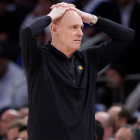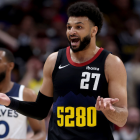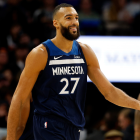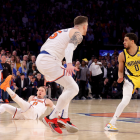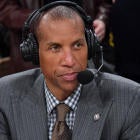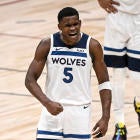NEW YORK -- Stephen Silas remembers how awful it was. The Charlotte Bobcats were the laughingstock of the league. Rookie Kemba Walker, fresh off a legendary run at UConn culminating in a national championship, could no longer will his team to victories. The Bobcats went 7-59 in the lockout-shortened 2011-12 season, finishing with the worst winning percentage in NBA history.
There was a 16-game losing streak and a 23-game losing streak. There was a back-to-back in which they followed up a 33-point loss with a 44-point loss. In the last week of the season, center Bismack Biyombo told Rudy Gay, then of the Memphis Grizzlies, that Time Warner Cable Arena was "my house." Gay responded by saying, "You have seven wins. It's everybody's house."
Walker spent most of the year backing up D.J. Augustin. There were bright spots -- a triple-double, nine 20-plus point games -- but losing took its toll. He shot 36.6 percent from the field, and many doubted he would translate college stardom to the NBA. As charismatic and energetic as Walker generally is, it is tough to be full of life when your team can't even compete.
"He had his down days, for sure," Silas said. "He struggled at times, especially when we were losing multiple games in a row and it didn't seem like there was any hope."
Silas is the only member of the now-Charlotte Hornets coaching staff left from those days, and Walker is the lone player. When Silas was promoted to lead assistant last summer, Walker was one of the first people to offer congratulations. There is a kinship between those who actually saw Charlotte turn things around, a tiny group that also includes trainer Steve Stricker and assistant trainer Dennis Williams. Now in his seventh season, Walker still tells teammates about the franchise's darkest hour.
"You don't forget seasons like that, man," Hornets forward Marvin Williams said.
Walker hasn't forgotten anything. But with endless work and a crucial coaching change, Walker has chipped away at his weaknesses every year since. When Silas watches Walker now, he sees a completely different, more advanced player. Walker has put the Hornets on his shoulders, and he wants the responsibilities that come with that. Don't be fooled by the fancy fake-outs and step-back jumpers -- Walker's game has as much substance as it has style.
CBS Sports spoke last week with a player who no longer is devalued for his size or build, but instead is one of the most efficient point guards in the NBA. Interviews with Walker and those around him illustrated the long path that led him from inconsistent gunner to elite playmaker.
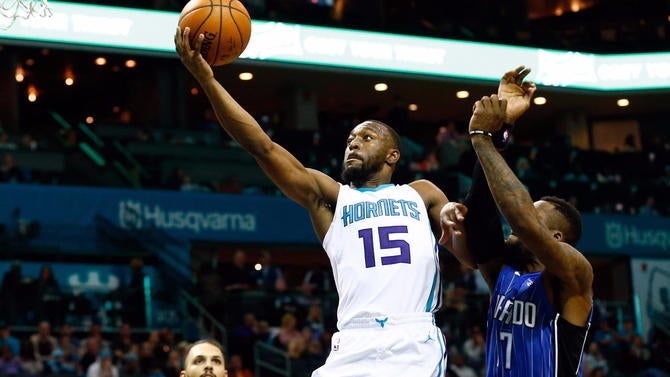
"Everybody knows where Kemba's chair is," Williams said. When the Hornets settle in for a film session, there is always a front-row seat for the franchise player. "No one sits in his chair. He sits dead in front of the TV every single day."
This is not an accident, nor is it an indication that Walker has poor eyesight.
"The leader has to be in front," Walker said. "I just want to show everybody that I'm locked in. If I'm locked in, they have no choice but to be locked in as well."
Hornets players and personnel are accustomed to hearing the phrase, "You're going to play the game you prepare to play." These words are especially likely to be used if they are lagging during a shootaround or a practice drill. At this point, though, no one knows if it will be coach Steve Clifford or Walker delivering the message.
"I've been around him for so long now, I even talk like him," Walker said.
Walker is grateful to have this connection. In his first three years as a professional, the season always started with a new coach, each with his own personality and philosophy. Unlike Paul Silas and Mike Dunlap, Clifford was able to stick around and build something with Walker. Five years into this partnership, Walker considers himself an extension of Clifford.
"He doesn't even have to say much anymore," Walker said. "I know when he's kind of getting frustrated with us in practice or whatever so I know when to speak up and try to get my guys going, even myself sometimes. I just know."
Charlotte big man Cody Zeller described Walker as "like another coach on the floor." The point guard understands what Clifford wants the offense to look like, and within that structure, he appreciates that Clifford "allows me to just play freely."
That freedom was earned. "He's a student of the game," Clifford said, praising Walker's professionalism, pride and desire to win. When he is at the front of the room like a teacher's pet, he is "not doing it for show," Hornets guard Jeremy Lamb said. Every game, Walker must know the ins and outs of what Charlotte and its opponents are trying to do. He wants to reward his coach for having confidence in him.
"From Day One, Coach Cliff, he told me I could be an All-Star in the league," Walker said. "From that day on, he turned me into one."
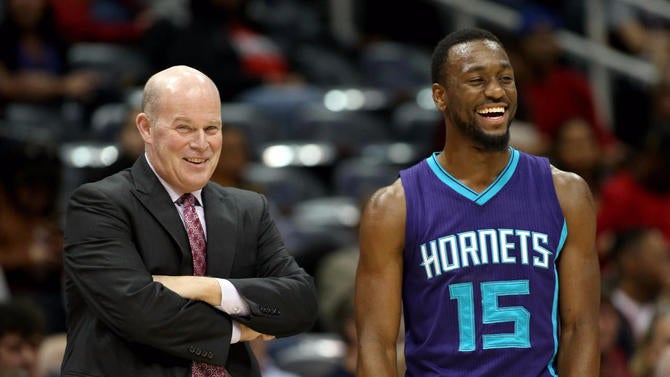
Compared to a few years ago, Walker said the game feels much slower. This is normal -- as you play more games, watch more film and get used to different defensive coverages, decision-making tends to become second-nature.
With Walker, however, the effect is more pronounced. Watch him run the pick-and-roll, and you will see him bend the entire defense to his will. Lamb, who played with Walker at UConn before reconnecting in Charlotte in 2015, still never knows what Walker is going to do until he does it.
"He's got a lot of different tricks," Lamb said. "He's got a lot of different things he does. You can expect something is gonna happen, but you don't know what's going to happen. It's always an energy boost for us."
It took Walker about 50 seconds to explain what is going through his head when he initiates a pick-and-roll. First, he is focused on getting the defender in front of him off-balance and away from his body, so the pick takes him out of the picture. "Then it's either I'm getting by the big," or, if the opposing big man has good position, "that means my teammate" -- usually Dwight Howard or Zeller -- "should be open on the roll," he said. If a weak-side defender steps up and picks up the roll man, then his man should be open. "It's many different reads," he said, and they have to be made in a split-second.
Walker is more dangerous than most point guards in these situations because he's so quick and crafty when it comes to getting to the rim and finishing. He is an expert in creating space and always a threat to pull up for a jumper. His acceleration and trickery with the ball in his hands are part of why he's so dangerous, too, but the key is that he times it right.
"I think only hoopers, only the players kind of understand," Walker said. "It's pretty difficult. It's all about being focused and it's all about putting the work in to get it down pat."
Before he played a game with Howard, Walker studied the eight-time All-Star's game. He has been watching Howard since before he was even in the NBA, but he wanted to know his new pick-and-roll partner's tendencies. Walker considers it his job to keep his teammates involved and engaged throughout the course of a game, and he will adjust his own attacking mentality depending on how others are playing.
"It's times when I'm not scoring and we start fast and we're playing well and the ball is moving and I don't really have to do much," Walker said. "But it's times where things are not going so well, then I have to get a little bit more aggressive. It's more about just reading the game for me."
Long after Hornets practice ended at the National Basketball Players Association's facility in midtown Manhattan, Walker went around the 3-point line: swish, swish, swish.
Once doubted because of his poor percentages from deep, Walker participated in the 3-point shootout last season. Once labeled a gunner, Walker has become one of the most efficient players at his position. As he took another jumper, Williams attempted to explain how this happened.
"This," Williams said, pointing to Walker. "You see what he's doing right now? He's been shooting for the last 40 minutes. Nonstop. He's a tireless worker, man."
In his first four seasons, Walker was not shy about shooting 3s but only made 31.7 percent of them. When he tweaked his release with assistant coach Bruce Kreutzer and improved his accuracy, it changed everything.
"His finishing has obviously improved a bunch, but his jumper has really made his game to where he's really hard to guard," Silas said. "He used to be someone who would just go, go, go. Now he can play different paces, he can shoot the 3, he can get in the paint, he can finish. He does it all."
Silas always knew Walker had the potential to be a star and was willing to work. He knew Walker "had the intangibles of being a big-game player" and showed leadership qualities. He'd be lying, however, if he said he foresaw Walker developing into this type of floor general.
"It's right at the top of the league," Silas said. "And that's a big jump from when he first came in. 'Cause when he first came in, teams were just going under his pick-and-rolls and they'd force him to shoot the jumper or they'd make him get all the way to the baseline and now he'd have to try to make plays around size. And now he dribbles through and does a lot of new things that he's developed over the years."
Walker will always have some limitations. He is generously listed at 6-foot-1, and that hurts him on defense. Despite his dazzling displays of dribbling, he has never been a particularly good isolation player. His incremental improvement has been exceptional, though -- to Lamb, he is a great teammate not only because he "makes the right pass every time," but because he is never satisfied.
"It gives me confidence, thinking no matter how good I'm playing or how hard I'm working, I can always work harder, I can always get better," Lamb said. "In college he was literally like a God to us. He was averaging ridiculous numbers. He led us all the way to a national championship and on top of that he kept getting better and kept getting better."
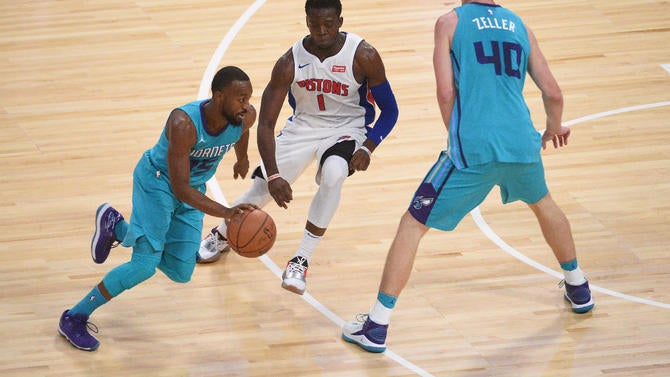
Walker's latest step forward is inside the 3-point line. Heading into Wednesday's game against the Cleveland Cavaliers, he is averaging 6.9 free throw attempts and making 90.4 percent of them this season. "I always get hit, I'm always on the floor, that's just the way I play," Walker said, dismissing the notion that the bumps he is taking could take a toll on his body.
"I am trying to be as aggressive as I can, trying to get to the line," Walker said. "But I'm being smart. I think it's being more mature, knowing how to draw fouls. It's been good for me to be able to get there. I know I probably complained a lot over the years to the refs. It's exciting."
With Charlotte undermanned, Walker has had to carry the team. Nicolas Batum, its next-best playmaker, missed the first 12 games of the year with a torn ligament in his elbow, and is due back against Cleveland. With Walker on the floor, the 5-7 Hornets have outscored opponents by 9.8 points per 100 posserssions. With him off the floor, they have been outscored by 24 points per 100 possessions.
If Charlotte is going to make noise in the East, it will need Batum to integrate himself and Lamb to keep shooting the lights out. It would help if Howard cut down his post-ups and the Hornets got more from their bench, too. The one guy Clifford doesn't have to worry about, though, is Walker. Everyone around him knows that he is willing to take the blame when they don't play well and pass out the credit when they do.
"He's kind of established the culture here, man," Williams said. "If you come to Charlotte, Kemba's the guy that you follow, man. You just kind of naturally do it. You see how hard he works, you see how great of a player he is and you just kind of follow suit."
As Walker exited the NBPA court, the last to leave practice, he looked back on his ignominious introduction to the league. "Everybody goes through adversity," he said, adding that he only had two options: Let the losing bring him down or work through it. His decision was never in question. Now, he said, he takes "huge pride" in the fact that he stuck it out and, with Clifford, charted a new course.
"I'm the only guy still there from that team," Walker said. "I knew what we were. I never want to go back to that situation. I never want to be at the bottom of the league ever again."















